-
IP addresses are NOT logged in this forum so there's no point asking. Please note that this forum is full of homophobes, racists, lunatics, schizophrenics & absolute nut jobs with a smattering of geniuses, Chinese chauvinists, Moderate Muslims and last but not least a couple of "know-it-alls" constantly sprouting their dubious wisdom. If you believe that content generated by unsavory characters might cause you offense PLEASE LEAVE NOW! Sammyboy Admin and Staff are not responsible for your hurt feelings should you choose to read any of the content here. The OTHER forum is HERE so please stop asking.
You are using an out of date browser. It may not display this or other websites correctly.
You should upgrade or use an alternative browser.
You should upgrade or use an alternative browser.
[Breaking] Japan hit by 7.6 scale earthquake. Tsunami warning sounding
- Thread starter Rogue Trader
- Start date
You bet. It can emerge in Indonesia too. Or Philippines.Godzilla waking up.
1st tsunami hit already!You bet. It can emerge in Indonesia too. Or Philippines.

https://www.indiatoday.in/world/vid...pan-tsunami-warning-issued-2482813-2024-01-01
Condolences to the Japanese People. So far, there are no reports of casualties, but sadly, as hours fly by...... However, the Japanese are a resilient People, whom will not give in to grief, but rise up to meet the challenges with courage, love & hope, as they had always done.
Based upon observations over decades, the 1st 6mths of the year often see earthquakes, & the subsequent 6 months alternates with hurricanes & cyclones.
Thus, may countries living along the tectonic plates such as China, Chile, USA San Andres fault lines, Sumatra Indonesia, etc, be PREPARED, Planet Earth is not as stable as some presumes, & thus the need for funds to find a second or more stable Earthlike homes in the stars....
Being Prepared means being ADAPTABILE. With our scientific advancements, we Humankind will find scientific reliable ways to built better quake & weather resistance habitats & infrastructure. Also, it would mean social DRILLS, for the govt agencies as well as population to be ready & know what to do when a calamitous event occurs, such as evacuation sites, medical facilities, hygiene, food & water, etc & the rainy day funds needed.
Ultimately, should one be caught in a calamitous event such as earthquake, the FIRST rule is NOT TO PANIC. Once panic emotions come, clouded judgements would be made & may cause not only loss of one's own life, but others as well.
2) If in a highrise, do not take the elevators, but exit in an orderly fashion thru the stairwells, as it is the strongest & safest part of any building. No need to panic, to push or step over others, as each life is precious & means something special to another.
3)Once out in the open, then RUN to OPEN grounds, to avoid any building collapse & the subsequent harmful unbreathable dust that will arise.
4)If one is living in coastal areas where Tsunami may occur after an earthquake, go to open ELEVATED grounds above 3m, or stay on the 2nd floor of any strong building that remains, as the waters are not expected to rise above 3m & no one can outrun a Tsunami.
5) Most critically, ensure one's handphone or radio is fully charged always, to listen to any govt emergency announcements, withdrawal routes & evacuation zones.
Such measures will save lives, & especially for tourists whom may not live in quake zones.....
Based upon observations over decades, the 1st 6mths of the year often see earthquakes, & the subsequent 6 months alternates with hurricanes & cyclones.
Thus, may countries living along the tectonic plates such as China, Chile, USA San Andres fault lines, Sumatra Indonesia, etc, be PREPARED, Planet Earth is not as stable as some presumes, & thus the need for funds to find a second or more stable Earthlike homes in the stars....
Being Prepared means being ADAPTABILE. With our scientific advancements, we Humankind will find scientific reliable ways to built better quake & weather resistance habitats & infrastructure. Also, it would mean social DRILLS, for the govt agencies as well as population to be ready & know what to do when a calamitous event occurs, such as evacuation sites, medical facilities, hygiene, food & water, etc & the rainy day funds needed.
Ultimately, should one be caught in a calamitous event such as earthquake, the FIRST rule is NOT TO PANIC. Once panic emotions come, clouded judgements would be made & may cause not only loss of one's own life, but others as well.
2) If in a highrise, do not take the elevators, but exit in an orderly fashion thru the stairwells, as it is the strongest & safest part of any building. No need to panic, to push or step over others, as each life is precious & means something special to another.
3)Once out in the open, then RUN to OPEN grounds, to avoid any building collapse & the subsequent harmful unbreathable dust that will arise.
4)If one is living in coastal areas where Tsunami may occur after an earthquake, go to open ELEVATED grounds above 3m, or stay on the 2nd floor of any strong building that remains, as the waters are not expected to rise above 3m & no one can outrun a Tsunami.
5) Most critically, ensure one's handphone or radio is fully charged always, to listen to any govt emergency announcements, withdrawal routes & evacuation zones.
Such measures will save lives, & especially for tourists whom may not live in quake zones.....
1st tsunami hit already!
https://www.indiatoday.in/world/vid...pan-tsunami-warning-issued-2482813-2024-01-01
Hope Indian Ocean gets one too, bring back the fun times experienced by the likes of Phuket, Penang and Sri Lanka.

Godzilla waking up.
For the Japs, the year of the dragon starts on the 1st of January, 2024.

Or Singapore. Do not underestimate Allah's wrath with MUIS.You bet. It can emerge in Indonesia too. Or Philippines.
Last edited:
how appropriate!For the Japs, the year of the dragon starts on the 1st of January, 2024.

But the non-muslims which form the majority of sg, are innocent. Why punish us when MUIS and the muslims are the scum?! Why?!Or Singapore. Do not underestimate Allah's wrath with MUIS.
We do not know in what form Allah's wrath will come. It may take the whole community or He may just punish the wrongdoers or He may delay it until Judgement Day.But the non-muslims which form the majority of sg, are innocent. Why punish us when MUIS and the muslims are the scum?! Why?!
Allah knows best.
Tsunami threat from Japan quake has 'largely passed': US agency
No irregularities were reported in nuclear plants after the powerful earthquake struck central Japan.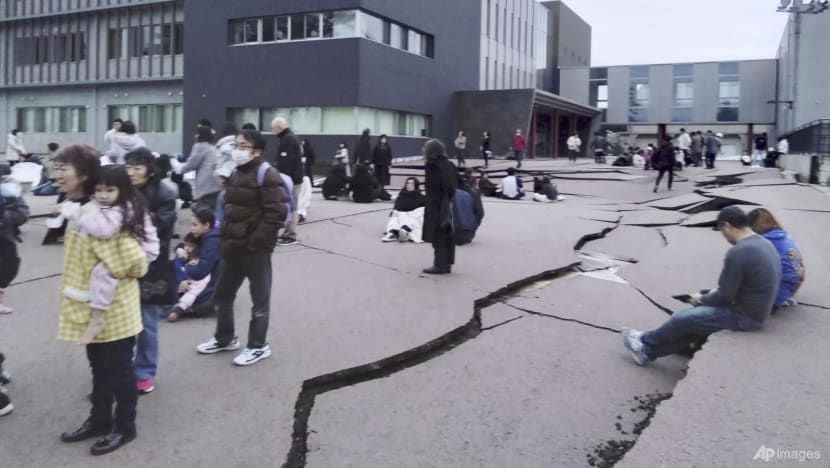
01 Jan 2024 03:41PM (Updated: 01 Jan 2024 11:03PM)
TOKYO: The tsunami threat from a powerful earthquake that struck central Japan on Monday (Jan 1) has "largely passed", a US agency said, after waves over a metre high had earlier hit some areas.
"The tsunami threat has now largely passed," the Hawaii-based Pacific Tsunami Warning Center said.
A powerful earthquake struck central Japan on Monday, triggering warnings for residents to evacuate some coastal areas, knocking out power to thousands of homes and disrupting flights and rail services to the affected region.
The quake with a preliminary magnitude of 7.6 triggered waves of about 1m along Japan's west coast and neighbouring South Korea, with authorities saying larger waves could follow.
The Japan Meteorological Agency (JMA) issued tsunami warnings for the prefectures of Ishikawa, Niigata and Toyama. A major tsunami warning - the first since the March 2011 earthquake and tsunami that struck northeastern Japan - was initially issued for Ishikawa but later downgraded.
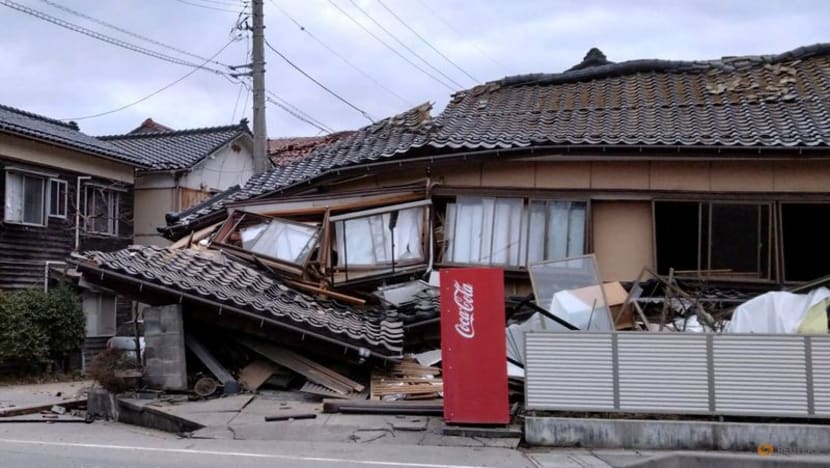
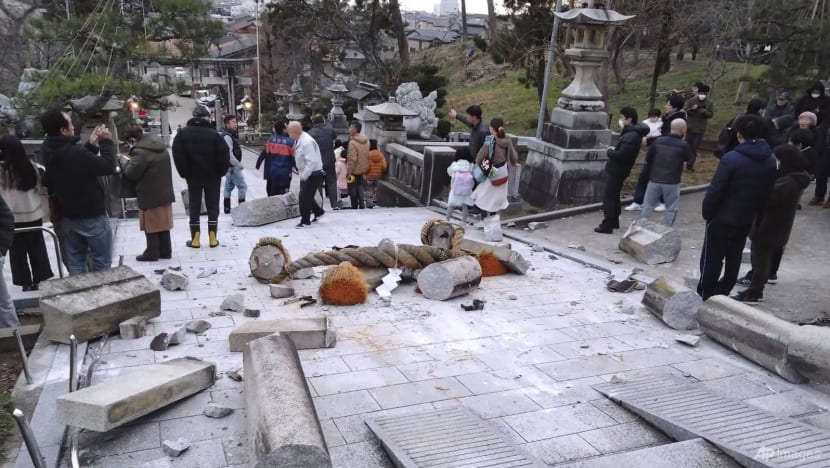
Russia and North Korea also issued tsunami warnings for some areas.
Houses have been destroyed, fires have broken out and army personnel have been dispatched to help with rescue operations, government spokesperson Yoshimasa Hayashi told reporters, adding that authorities were still assessing the damage.
More strong quakes in the area, where seismic activity has been simmering for more than three years, could occur over coming days, JMA official Toshihiro Shimoyama said.
In comments to the press shortly after the quake struck, Prime Minister Fumio Kishida also warned residents to prepare for more disasters.
"I urge people in areas where tsunamis are expected to evacuate as soon as possible," Kishida said.
"Tsunami! Evacuate!" a bright yellow warning flashed across television screens advising residents in specific areas of the coast to immediately evacuate their homes.
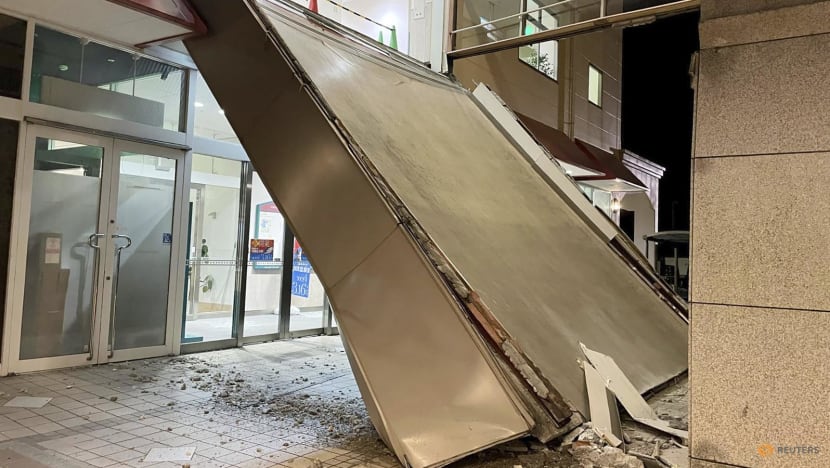
Images carried by local media showed a building collapsing in a plume of dust in the city of Suzu and a huge crack in a road in Wajima where panicked-looking parents clutched their children. There have been reports of at least 30 collapsed buildings in Wajima, a town of around 30,000 known for its lacquerware, and a major blaze has engulfed several buildings.
The quake also jolted buildings in the capital Tokyo, about 500km from Wajima on the opposite coast.
More than 36,000 households had lost power in Ishikawa and Toyama prefectures, areas where temperatures were set to drop to near freezing overnight, according to utilities provider Hokuriku Electric Power. Telecom operators also reported phone and internet outages in some areas.
The extent of any injuries and deaths was unclear. Two people recovered from quake debris in Ishikawa prefecture were unresponsive, public broadcaster NHK reported.
Forty train lines and two high-speed rail services to the quake-hit area halted operations, while six expressways were closed and one of Ishikawa's airports was forced to shut due to a crack in the runway, transport authorities said.
Japanese airline ANA turned back planes headed to airports in Toyama and Ishikawa, while Japan Airlines cancelled most of its services to the Niigata and Ishikawa regions.
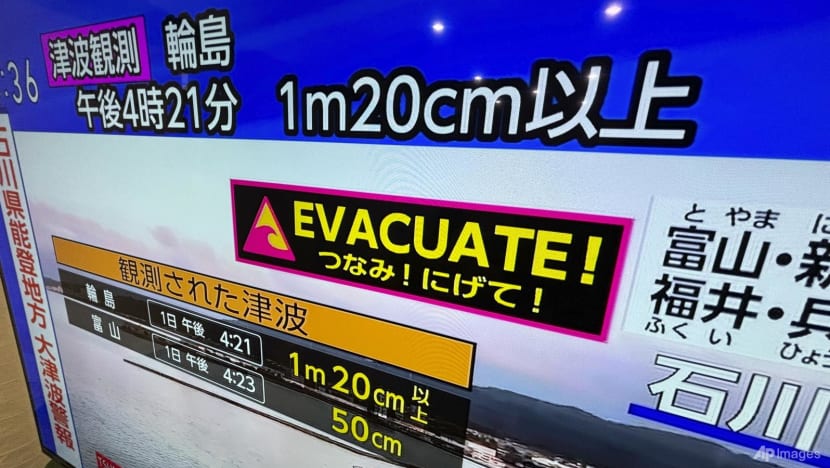
NUCLEAR PLANTS
The quake comes at a sensitive time for Japan's nuclear industry, which has faced fierce opposition from some locals since a 2011 earthquake and tsunami triggered nuclear meltdowns in Fukushima. Nearly 20,000 people were killed and whole towns devastated in the disaster.Japan last week lifted an operational ban imposed on the world's biggest nuclear plant, Kashiwazaki-Kariwa, which has been offline since the 2011 tsunami.
Japan’s Nuclear Regulation Authority said no irregularities have been confirmed at nuclear power plants along the Sea of Japan, including five active reactors at Kansai Electric Power’s Ohi and Takahama plants in Fukui Prefecture.
Hokuriku's Shika plant in Ishikawa, the closest nuclear power station to the quake’s epicentre, had already halted its two reactors before the quake for regular inspections and saw no impact from the quake, the agency said.
Monday's quake struck during the Jan 1 public holiday when millions of Japanese traditionally visit temples to mark the new year.
In Kanazawa, a popular tourist destination in Ishikawa, images showed the remnants of a shattered stone gate strewn at the entrance of a shrine as anxious worshippers looked on.
Kanazawa resident Ayako Daikai said she had evacuated to a nearby elementary school with her husband and two children soon after the earthquake hit. Classrooms, stairwells, hallways and the gymnasium were all packed with evacuees, she said.
"We haven't decided when to return home yet," she told Reuters when contacted by telephone.
The jolt was also felt by tourists who had flocked to Japan's mountainous Nagano region for the start of the snow sports season.
Johnny Wu, a 50-year-old Taiwanese snowboarder, was waiting for a shuttle bus back to his hotel in the resort town of Hakuba when the quake hit, rattling windows and shaking snow off roofs and overhead electric wires.
"Everybody was panicked at that time. I’m a little bit better because, I come from Taiwan, so I've experienced a lot. But ... (I'm) still worried about (the quake) getting more serious," he said.
omen of things to come. expect more natural disaster. dragons are aggressive and violent creatures.
MFA: all sinkies have safely returned to sg. No one was affected by the quake.
Similar threads
- Replies
- 18
- Views
- 594
- Replies
- 86
- Views
- 3K
- Replies
- 1
- Views
- 329
- Replies
- 0
- Views
- 157
- Replies
- 3
- Views
- 342


